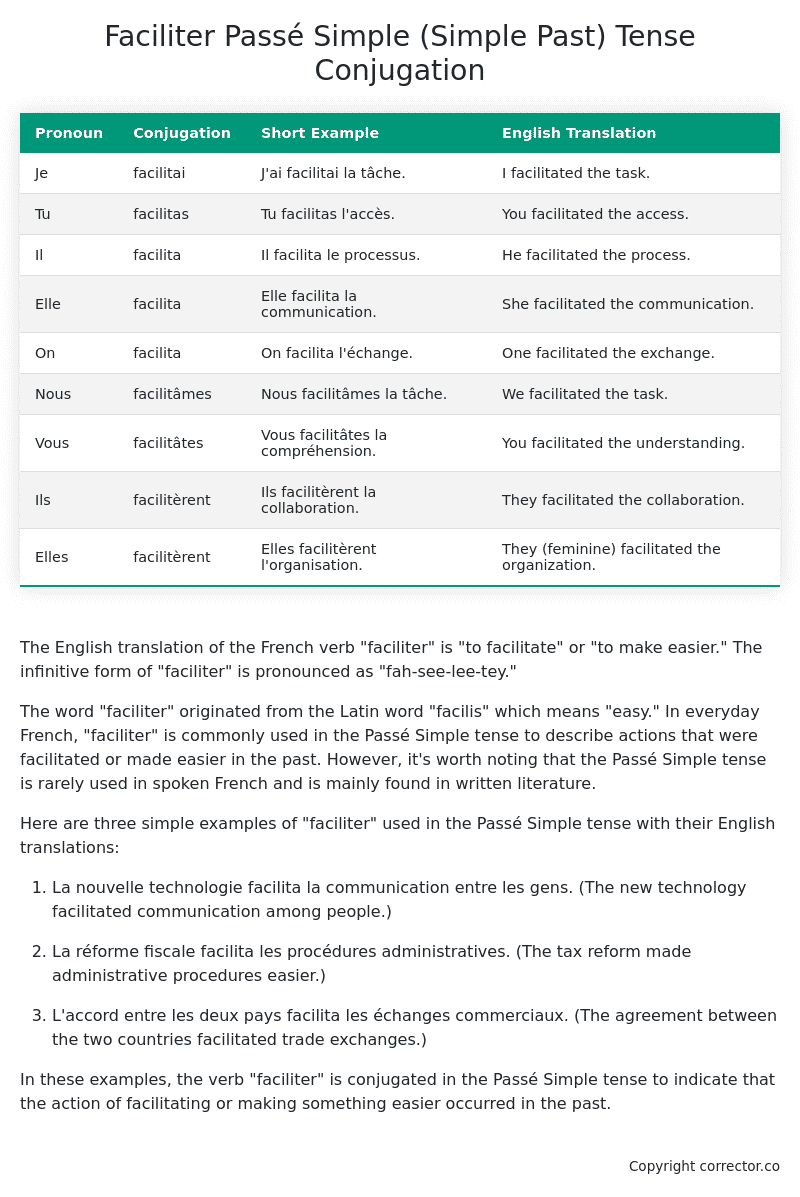Passé Simple (Simple Past) Tense Conjugation of the French Verb faciliter
Introduction to the verb faciliter
The English translation of the French verb “faciliter” is “to facilitate” or “to make easier.” The infinitive form of “faciliter” is pronounced as “fah-see-lee-tey.”
The word “faciliter” originated from the Latin word “facilis” which means “easy.” In everyday French, “faciliter” is commonly used in the Passé Simple tense to describe actions that were facilitated or made easier in the past. However, it’s worth noting that the Passé Simple tense is rarely used in spoken French and is mainly found in written literature.
Here are three simple examples of “faciliter” used in the Passé Simple tense with their English translations:
-
La nouvelle technologie facilita la communication entre les gens. (The new technology facilitated communication among people.)
-
La réforme fiscale facilita les procédures administratives. (The tax reform made administrative procedures easier.)
-
L’accord entre les deux pays facilita les échanges commerciaux. (The agreement between the two countries facilitated trade exchanges.)
In these examples, the verb “faciliter” is conjugated in the Passé Simple tense to indicate that the action of facilitating or making something easier occurred in the past.
Table of the Passé Simple (Simple Past) Tense Conjugation of faciliter
| Pronoun | Conjugation | Short Example | English Translation |
|---|---|---|---|
| Je | facilitai | J’ai facilitai la tâche. | I facilitated the task. |
| Tu | facilitas | Tu facilitas l’accès. | You facilitated the access. |
| Il | facilita | Il facilita le processus. | He facilitated the process. |
| Elle | facilita | Elle facilita la communication. | She facilitated the communication. |
| On | facilita | On facilita l’échange. | One facilitated the exchange. |
| Nous | facilitâmes | Nous facilitâmes la tâche. | We facilitated the task. |
| Vous | facilitâtes | Vous facilitâtes la compréhension. | You facilitated the understanding. |
| Ils | facilitèrent | Ils facilitèrent la collaboration. | They facilitated the collaboration. |
| Elles | facilitèrent | Elles facilitèrent l’organisation. | They (feminine) facilitated the organization. |
Other Conjugations for Faciliter.
Le Present (Present Tense) Conjugation of the French Verb faciliter
Imparfait (Imperfect) Tense Conjugation of the French Verb faciliter
Passé Simple (Simple Past) Tense Conjugation of the French Verb faciliter (You’re reading it right now!)
Passé Composé (Present Perfect) Tense Conjugation of the French Verb faciliter
Futur Simple (Simple Future) Tense Conjugation of the French Verb faciliter
Futur Proche (Near Future) Tense Conjugation of the French Verb faciliter
Plus-que-parfait (Pluperfect) Tense Conjugation of the French Verb faciliter
Passé Antérieur (Past Anterior) Tense Conjugation of the French Verb faciliter
Futur Antérieur (Future Anterior) Tense Conjugation of the French Verb faciliter
Subjonctif Présent (Subjunctive Present) Tense Conjugation of the French Verb faciliter
Subjonctif Passé (Subjunctive Past) Tense Conjugation of the French Verb faciliter
Subjonctif Imparfait (Subjunctive Imperfect) Tense Conjugation of the French Verb faciliter
Subjonctif Plus-que-parfait (Subjunctive Pluperfect) Tense Conjugation of the French Verb faciliter
Conditionnel Présent (Conditional Present) Tense Conjugation of the French Verb faciliter
Conditionnel Passé (Conditional Past) Tense Conjugation of the French Verb faciliter
Conditionnel Passé II (Conditional Past II) Tense Conjugation of the French Verb faciliter
L’impératif Présent (Imperative Present) Tense Conjugation of the French Verb faciliter
L’impératif Passé (Imperative Past) Tense Conjugation of the French Verb faciliter
L’infinitif Présent (Infinitive Present) Tense Conjugation of the French Verb faciliter
L’infinitif Passé (Infinitive Past) Tense Conjugation of the French Verb faciliter
Le Participe Présent (Present Participle) Tense Conjugation of the French Verb faciliter
Le Participe Passé (Past Participle) Tense Conjugation of the French Verb faciliter
Struggling with French verbs or the language in general? Why not use our free French Grammar Checker – no registration required!
Get a FREE Download Study Sheet of this Conjugation 🔥
Simply right click the image below, click “save image” and get your free reference for the faciliter Passé Simple tense conjugation!

Faciliter – About the French Passé Simple (Simple Past) Tense
Formation
Usage
Narration
Historical Context
Interactions with other tenses
Passé Composé
Imparfait
Conditional and Subjunctive
Summary
I hope you enjoyed this article on the verb faciliter. Still in a learning mood? Check out another TOTALLY random French verb conjugation!


